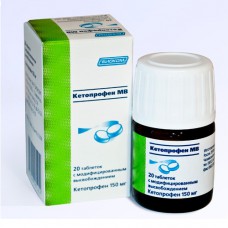Expiration date: 03/2026
Composition
1 tablet contains Ketoprofen-150 mg
Packaging
100 PCs.
Pharmacological action
Ketoprofen-nonsteroidal anti-inflammatory drug, has anti-inflammatory, analgesic and antipyretic effects associated with the suppression of the activity of cyclooxygenase 1 and 2, regulating the synthesis of prostaglandins and bradykinina, stabilizes lysosomal membranes.
It does not have a negative impact on the condition of articular cartilage.
Indications
Inflammatory and degenerative diseases of the musculoskeletal system: rheumatoid, psoriatic arthritis, Bekhterev's disease (ankylosing spondylitis), gout arthritis, osteoarthritis.
The drug is intended for symptomatic therapy, reduce pain and inflammation at the time of use, the progression of the disease does not affect.
Pain syndrome: myalgia, ossalgia, neuralgia, tendonitis, arthralgia, bursitis, radiculitis, adnexitis, otitis media, headache, dental pain, cancer, post-traumatic and postoperative pain syndrome accompanied by inflammation, algomenorrhea.
Contraindications
Hypersensitivity to Ketoprofen and other components of the drug, as well as to other nonsteroidal anti-inflammatory drugs. Complete or incomplete combination of bronchial asthma, recurrent nasal liposis or paranasal sinuses and intolerance to acetylsalicylic acid or other NSAIDs (including history). A peptic ulcer of a stomach and 12 duodenal ulcer (acute stage), Jaz-tively colitis (acute stage), Crohn's disease, hemophilia and other-violations of blood clotting, confirmed hyperkalemia, diverticulitis, peptic ulcer, active gastrointestinal bleeding, inflammatory bowel disease, decompensated heart failure, since the coronary artery bypass grafting, severe hepatic insufficiency or active liver disease, severe renal insufficiency (KK less 30 ml/min), progressive kidney disease, children's age (up to 15 years), pregnancy (III trimester), breastfeeding.
Application during pregnancy and breast-feeding
In the third trimester of pregnancy, the use of Ketoprofen is contraindicated.
In the first and second trimesters of pregnancy, the appointment of the drug is possible only if the intended benefit to the mother exceeds the potential risk to the fetus.
During lactation, when taking the drug, it is necessary to resolve the issue of cessation of breastfeeding.
Method of application and doses
Inside, during or after meals, 1 tablet (150 mg) 1 time per day. The tablets should be swallowed whole, without chewing, drinking plenty (at least 100 ml) of water or milk.
You should use the minimum effective dose of the minimum possible short course.
Side effect
- From the digestive system: often-dyspepsia (nausea, diarrhea or constipation,
- flatulence, vomiting, heartburn, loss of appetite, ) NSAID-induced gastropathy, stomach pain, stomatitis,
- impaired liver function, rarely-perforation of the gastrointestinal tract, exacerbation of Crohn's disease, melanoma, gingival, gastrointestinal, hemorrhoidal bleeding.
From the Central nervous system: often - headache, dizziness, insomnia, drowsiness, fatigue, excitement, nervousness, depression, asthenia, rarely - confusion or loss of consciousness, forgetfulness, migraine, peripheral neuropathy, very rarely - hallucinations, disorientation and speech disorder.
From the sensory organs: rarely-noise or ringing in the ears, blurred visual perception, taste change, conjunctivitis, hearing loss, dryness of the mucous membrane of the eye, eye pain, hyperemia of the conjunctiva, vertigo.
From CCC: rarely-tachycardia, hypertension, peripheral edema.
From the hematopoietic organs: Ketoprofen reduces platelet aggregation, transient increase in liver enzymes, rarely-agranulocytosis, anemia, thrombocytopenia, purpura, hemolytic anemia, leukopenia.
From the urinary system: rarely - impaired renal function, cystitis, urethritis, interstitial nephritis, nephrotic syndrome, hematuria (more common in people who take long-term NSAIDs and diuretics).
Allergic reactions: often-skin reactions (itching, urticaria), rarely - rhinitis, shortness of breath, bronchospasm, angioedema, anaphylactoid reactions, exfoliative dermatitis.
Other: increased sweating, rarely - hemoptysis, epistaxis, menometrorrhagia, muscle twitching, thirst, photosensitivity.
Special instruction
Ketoprofen can be drunk with milk or taken with antacids to reduce the incidence of gastrointestinal disorders, antacids and milk do not affect the absorption of the drug.
During treatment, it is necessary to control the picture of peripheral blood and the functional state of the liver and kidneys, especially in elderly patients.
At infringement of function of kidneys and liver should reduce the dose and closely monitored.
If it is necessary to determine 17-ketosteroids, the drug should be canceled 48 hours before the study.
Taking the drug can mask the signs of an infectious disease.
You should not use this medication simultaneously with other NSAIDs.
During the period of treatment must be careful when driving and occupation of other potentially hazardous activities, require high concentration and psychomotor speed reactions.
Drug interaction
Ketoprofen can weaken the effect of diuretics and antihypertensive agents and enhance the effect of oral hypoglycemic and some anticonvulsants (phenytoin).
Joint reception with other NSAIDs, corticosteroids, salicylates, ethanol, corticotropin increases the risk of adverse events from the gastrointestinal tract.
Co-administration with anticoagulants, with thrombolytic drugs, antiplatelet agents, and zefoperazonom, cefamandole, cefotetan and moxalactam increases the risk of bleeding.
While taking non-steroidal anti-inflammatory drugs with diuretics and ACE inhibitors increases the risk of renal dysfunction.
Increases plasma concentrations of cardiac glycosides, slow calcium channel blockers, lithium preparations, cyclosporine, methotrexate.
Nonsteroidal anti-inflammatory drugs can reduce the effectiveness of mifepristone. The NSAIDs should be started no earlier than 8-12 days after discontinuation of mifepristone.
Inductors of microsomal oxidation in the liver (phenytoin, ethanol, barbiturates, rifampicin, phenylbutazone, tricyclic antidepressants) increase the production of hydroxylated active metabolites.
Joint appointment with sodium valproate causes a violation of platelet aggregation.
Increases hypoglycemic effect of insulin and oral hypoglycemic drugs (requires the recalculation of doses).
Mielotoksicskie HP increase symptoms gematotoksichnosti drug.
Overdose
When overdosing Ketoprofen, as well as other nonsteroidal anti-inflammatory drugs, there may be nausea, vomiting, vomiting with blood, abdominal pain, melena, unconsciousness, respiratory depression, convulsions, impaired renal function and renal failure.
There is no specific antidote. Treatment is symptomatic. The impact of Ketoprofen on the gastrointestinal tract can be reduced with the help of H2-receptor antagonists, proton pump inhibitors and prostaglandins. Gastric lavage and the use of activated carbon are shown.
Storage conditions
In a dry, dark place, at a temperature not exceeding 25 °C.
Shelf life
5 years.


